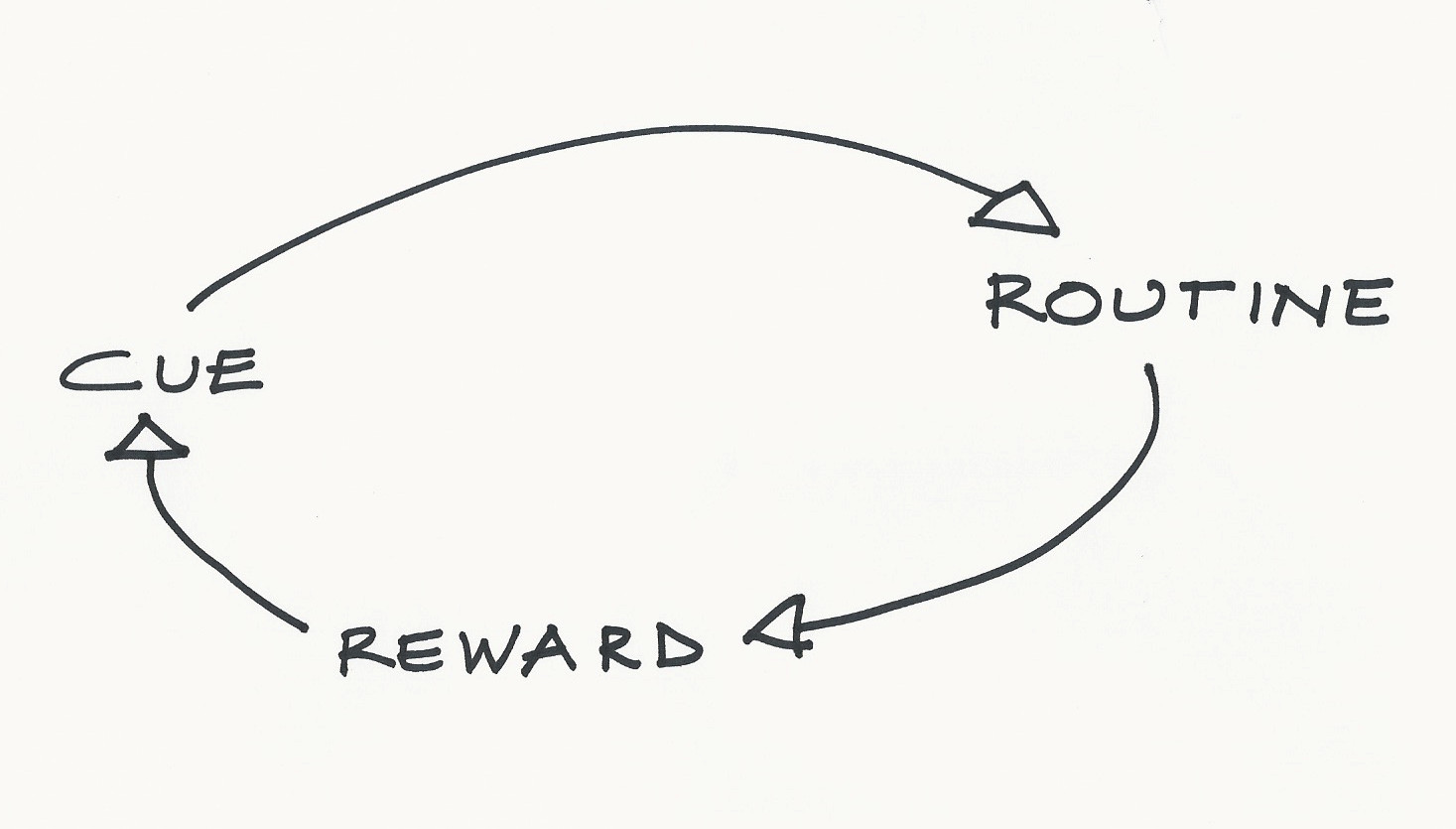How to Create Healthy Habits
Have you ever taken out an expensive gym membership only for it to be unused after a few months? Have you started with a personal prayer time each morning only to find your routine disrupted by school vacation, and then you have a hard time getting back to it? Have you begun to eat more healthily but then found it difficult to be consistent?
How do we make our good intentions a solid reality?
How do we turn our desires into regular practice?
How do we change our failures into successes?
How do we develop healthy habits?
Healthy Habits
Scientists at Massachusetts Institute of Technology in Boston discovered that habit-forming takes place in the brain. For all you brain surgeons out there, this area of the brain, which I can barely pronounce, is called the basal ganglia.
The researchers at MIT, writes Charles Duhigg in his book The Power of Habit, found a habit is a neurological loop consisting of a cue, a routine and a reward.
 The Cue
The Cue
The cue is a trigger telling your brain to perform the routine. For example, my cue for exercise is to put on my fitness gear. I do this as soon as I get out of bed in the morning.
When snow is not covering the ground and I can go to the track in the center of Lexington, this is my cue for prayer.
My husband’s cue to eat more healthily is to choose a smaller dinner plate.
The Routine
The cue leads onto the routine. The routine is any behavior you want to repeat on a regular basis. Putting on my sports top and pants leads me to do some form of physical exercise, whether it’s using my exercise bike or free weights, before I shower and start my day and get distracted by everything I need to do. Or, the moment my foot hits the track it leads me to pray. When my husband takes a smaller dinner plate, this leads to him eating smaller portions of food.
The Reward
The routine then generates a reward. You can create your own reward, but with exercise, prayer and healthy eating, I find the rewards come naturally. For example, after exercising I feel good. I am less stressed. My muscles may ache and a new exercise may be difficult, but if I continue I will get more rewards as the routine becomes easier and my body becomes more toned. This may surprise you, but I also get financial rewards. By logging my physical exercise with Balance Rewards through Walgreens I earn points, which transfer into monetary savings.
With prayer, I feel calmer after bringing my anxieties to God, particularly if I combine my prayer time with walking or using the exercise bike.
My husband says he feels much better having eaten a smaller portion at dinner, instead of the bloated feeling from overeating.
Chunking
When we experience rewards, it is easier to repeat the routine the next time we are prompted by a cue. This helps form the habit. Eventually, the cue—routine—reward loop becomes automatic because the brain, constantly looking for ways to save effort and become more efficient, converts a sequence of actions into an automatic behavior.
This process is called chunking. Once chunking occurs, the habit is formed. The best example I can think of the brain doing chunking, and I’m sure you have had this experience, is when you leave your house and suddenly discover you’re driving your regular route to work, to church or to school when you intended to go somewhere else.
Cravings
In addition to the habit loop becoming automatic, the brain creates neurological cravings that drive the habit. The brain anticipates the reward, and it creates a craving for that reward.
When our brain associates a cue with a reward, a subconscious craving emerges. For example, if I put on my exercise attire in the morning and I don’t do my exercise and prayer, like this morning because I wanted to get this written and sent to you, I feel twitchy until I get my reward of feeling good—that release of endorphins from my exercise and peace from spending time with God.
In Community
One other final exciting fact about habits is they are formed more easily with a group of people than on your own. When you see a change in someone else, you believe you are capable of changing, too. Community creates belief. This is one reason why we feel creating a Culture Of Wellness community is important.
Over the next few weeks, I want you to try and develop a healthy habit, and to share with the Prayer Zone Workout community.
Create your healthy habit
Cue: Write down some cues you think might work for you as you try to form a healthy habit. Then select one and try it out. If it does not work, try out another cue. Do not give up—keep experimenting to find the right cue. When you have found one that works, share what it is and why it works for you.
Routine: For your routine, dream big but set realistic goals. If you set a goal too high and you fail to achieve it, you will be less likely to try again the next time. Don’t give up. Alter your goal. Make it fit your life. Set yourself up for success. Write down some achievable and realistic goals.
Share your achievements, successes or failures, so we can encourage each other. Either comment below (and we love comments) or join the Prayer Zone Workout Facebook group and share there.
Much of the information for this post was taken from a book by Charles Duhigg, The Power of Habit: Why We Do What We Do in Life and Business.
I also have a chapter on healthy habits in my book Prayer Zone Workout: Spiritual and Physical Exercise for the Heart.
Leave a Reply